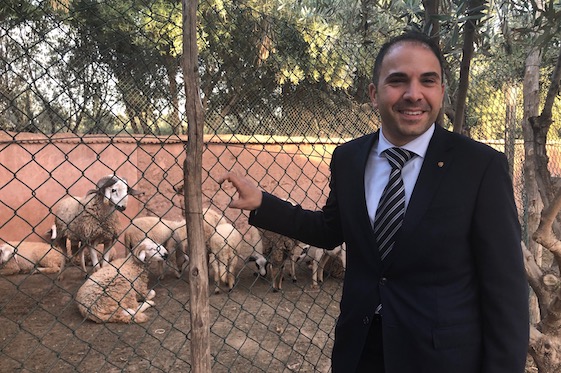“Having our own organic farm has so many benefits,” says Afif Salibi, general manager of the 134-room Fairmont Royal Palm, Marrakech, Morocco. “Over Easter, we had kids’ egg hunts here, and we had a petting farm. Our animals include a couple of dozen rabbits, and donkeys and ponies from the city’s rescue center, and hens and ducks, and lots of sheep,” explained the GM, who has become a keen amateur farmer.

He arrived at what was the 4-year-old Beachcomber Royal Palm on May 14, 2017. It was all set to re-flag the following day – the owners, New Mauritius Hotels Ltd., based on the Indian Ocean island of Mauritius, wanted more exposure of the 571-acre property. As well as the hotel, the complex includes an 18-hole Cabell Robinson-designed golf course, and 90 sizeable villas, all sold to Europeans as second homes: Still to come are 39 Fairmont Residences, to be sold with freehold, and a ballroom that will seat 300 comfortably.
“New Mauritius started planning all this about 11 years ago, and from the beginning they brought in mature forestation. We now have slightly more than 4,000 adult olive trees, transplanted from all over Morocco. Every year we produce over 5,000 pints of olive oil, which we use, and sell,” explained Salibi.
When he arrived he also found trees producing figs, oranges, lemons and peaches. These were planted next to a 12-acre site reserved for a farm, of which 5 acres are now already operating.
“We had to start from scratch, plowing and adding fertilized soil, and manure from our sheep – we use no pesticides, everything is organic. Our total workforce of 400 includes 30 gardeners working the hotel grounds and the farm. Fortunately, the head golf groundsman is a keen and experienced agriculturalist and he has been a tremendous help,” Salibi said. There are neat rows of vegetables, and salad foodstuffs and herbs. Strawberries are in a black net cage. A composter, which eats left-over food, supplies nutrients, and bees help with pollination.
The hotel’s French executive chef, who is passionate about farm-to-table, holds regular cooking classes in a permanent kitchen in the farm area: Students pick their own ingredients before classes start. Several times every day the culinary team comes by to harvest what is needed in the hotel’s own restaurants tonight.
“We are not doing this for financial reasons – at this stage, growing our own is more expensive than buying in. Food costs do not even come into the equation right now,” admitted Salibi. “We are farming to get even better produce for our guests and yes, I am even thinking of offering volunteering, making it possible to help on the farm.”
